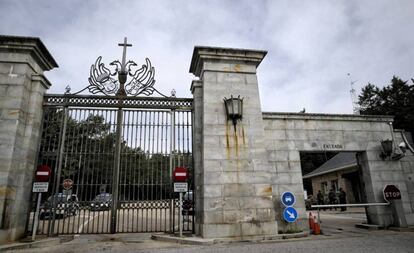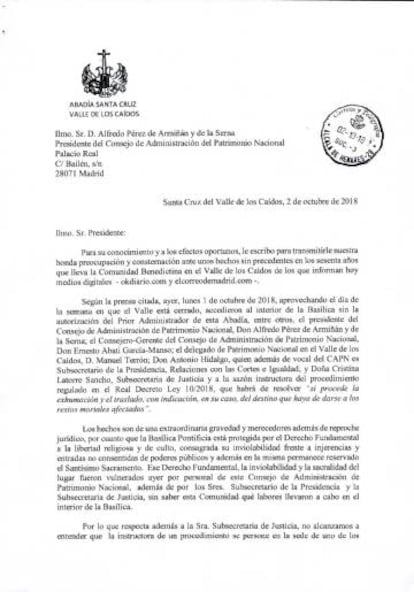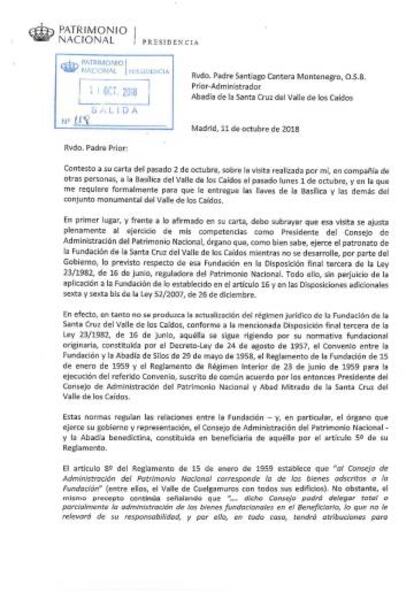Prior at Valley of the Fallen demands state hand over its keys to monument
Father Santiago Cantera, who is fiercely opposed to former dictator Francisco Franco being exhumed from the site, took exception to an unannounced visit by civil servants


Everything was ready for “10-J,” as today, June 10, had been dubbed. The Spanish government had set the date for the long-awaited exhumation of Francisco Franco from the Valley of the Fallen monument, more than 43 years after the death of the former dictator. The Socialist Party-led administration had a “Plan A,” a “Plan B” and even a “Plan C” to ensure that its star policy, which was announced very shortly after Prime Minister Pedro Sánchez came to power last June, was successful.
The acting prior at the basilica, Father Santiago Cantera, became involved in a bad-tempered dispute with the Spanish state
But 10-J has arrived, and Franco is still in his tomb in the basilica, located around 55 kilometers northwest of Madrid. The Supreme Court last week suspended the process, until all of the legal appeals filed by the Franco family are definitively ruled on and there is no chance of a successful case in their favor once Franco has been removed from his resting place and taken to El Pardo cemetery in Madrid.
It is not, however, just the Franco family that is putting obstacles in the way of the process. The acting prior at the basilica, Father Santiago Cantera, became involved in a bad-tempered dispute with the Spanish state late last year over who should have the control of the keys used to access the Valley of the Fallen.

On October 1, while the Spanish Cabinet was seeking agreements and taking decisions in a bid to speed up the exhumation process, a group of senior civil servants from Spain’s Patrimonio Nacional (National Heritage) agency – the body tasked with administering the sites owned by the state – made an unannounced visit to the Valley of the Fallen basilica. They chose a Monday, the day when the site is closed to the public. Along with the president of Patrimonio Nacional, Alfredo Pérez de Armiñán, were a number of his colleagues, as well as an undersecretary from the Justice Ministry, Cristina Latorra, the person in charge of overseeing the exhumation process.

The Spanish executive was convinced at the time that the exhumation could be completed quickly, and wanted to anticipate all possible scenarios. The president of Patrimonio Nacional had tried to sound out the prior at the Valley – both in person and by telephone – as to whether he was willing to cooperate, and had confirmed on a number of occasions that the answer was a resounding no. Contact with, and pressure from, the leadership of the Church, both in Madrid and Rome, had served for little. Cantera would not see reason, and meanwhile the grandchildren of the Spanish dictator were taking their battle to keep their grandfather where he is to the highest reaches of the Spanish legal system.
Father Cantera was not previously informed about the institutional visit, and took it very badly. The next day, on October 2, he sent a somewhat undiplomatic two-page letter to the president of Patrimonio Nacional, communicating his “deep concern and consternation over unprecedented events in the 60 years that the Benedictine Community has been in the Valley.” He described the visit by the group of officials as “extraordinarily serious and worthy of judicial reproach.” In his missive, Cantera argued that the Pontifical Basilica “is protected by the Fundamental Right of religious freedom, its sanctity enshrined in the face of interference and non-consented entry by public powers.”
The prior “formally” requested that the president of Patrimonio Nacional hand over “the keys to the Basilica”
Father Cantera also directly questioned the presence of the undersecretary on the basis it revealed “a lack of impartiality, objectivity” in terms of her handling of the case. He concluded that accessing the site without prior warning “is neither lawful nor legitimate.” And as such, he “formally” requested that the president of Patrimonio Nacional hand over “the keys to the Basilica and any others from the monument that may be in your possession.”
The president replied the next day, reminding the prior that the visit was within his powers, and that a Franco-era regulation covering the Valley states that it is Patrimonio’s responsibility to administer and inspect all of the buildings at the site. He concluded by stating that given these responsibilities, he “could not agree to his request to hand over the keys.”
The government took careful note of this exchange of letters, should Father Cantera have been planning on putting any kind of new obstacle in the way of the exhumation of Franco from the Valley of the Fallen.
In January, Cantera refused to grant the government authorization to access Franco’s tomb. Cantera, who was a former candidate for the neo-fascist party Falange, denied the government’s request, citing the strong opposition of the Franco family to the exhumation and the legal dispute over the exhumation in the courts.
EL PAÍS has been in touch with Father Cantera to request his version of his events, but received no response.
English version by Simon Hunter.
Tu suscripción se está usando en otro dispositivo
¿Quieres añadir otro usuario a tu suscripción?
Si continúas leyendo en este dispositivo, no se podrá leer en el otro.
FlechaTu suscripción se está usando en otro dispositivo y solo puedes acceder a EL PAÍS desde un dispositivo a la vez.
Si quieres compartir tu cuenta, cambia tu suscripción a la modalidad Premium, así podrás añadir otro usuario. Cada uno accederá con su propia cuenta de email, lo que os permitirá personalizar vuestra experiencia en EL PAÍS.
¿Tienes una suscripción de empresa? Accede aquí para contratar más cuentas.
En el caso de no saber quién está usando tu cuenta, te recomendamos cambiar tu contraseña aquí.
Si decides continuar compartiendo tu cuenta, este mensaje se mostrará en tu dispositivo y en el de la otra persona que está usando tu cuenta de forma indefinida, afectando a tu experiencia de lectura. Puedes consultar aquí los términos y condiciones de la suscripción digital.








































